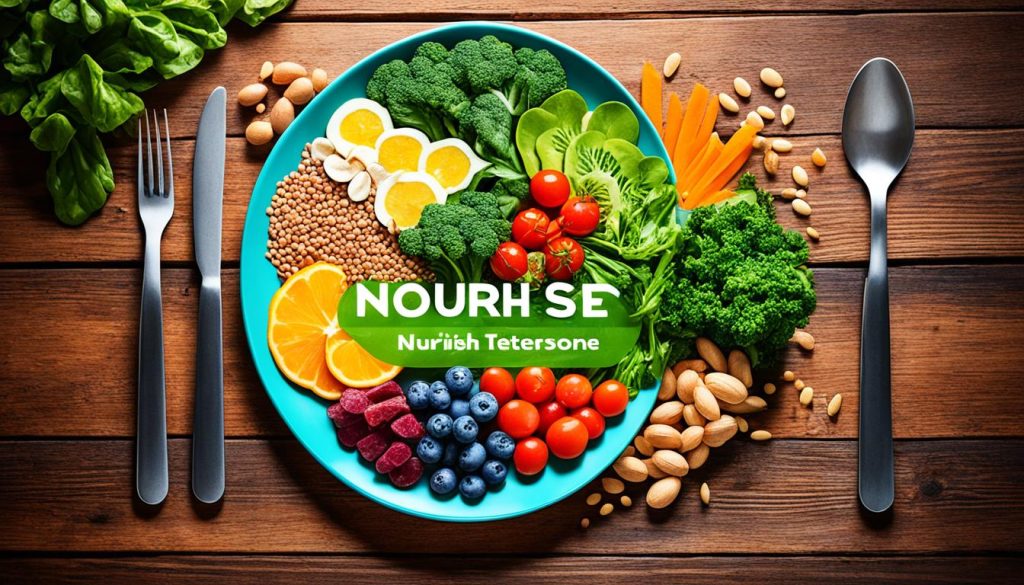Ad Blocker Detected
Our website is made possible by displaying online advertisements to our visitors. Please consider supporting us by disabling your ad blocker.
Are you looking for natural ways to increase your libido and testosterone levels? Look no further! In this article, we will explore evidence-based tips and remedies to help you boost your libido and enhance your overall sexual function. Whether you’re a male or female, optimal testosterone levels are crucial for your health and well-being. Let’s dive in!
Key Takeaways:
- Regular exercise, particularly weightlifting and high-intensity interval training (HIIT), can effectively increase testosterone levels.
- A balanced diet with essential nutrients like zinc, vitamin D, and healthy fats can support healthy testosterone production.
- Stress management techniques such as physical activity, adequate sleep, and meditation can help reduce cortisol levels and promote healthy testosterone production.
- Vitamin D deficiency has been linked to lower testosterone levels, so ensure you get sufficient sun exposure or consider supplementation.
- Certain supplements, such as zinc, saw palmetto, ginger, and ashwagandha, may have potential benefits in boosting testosterone levels.
Exercise and Lift Weights
Regular exercise, particularly weightlifting and high-intensity interval training (HIIT), can effectively increase testosterone levels. Physical activity is also beneficial for preventing lifestyle-related diseases. Studies have shown that increased physical activity is more effective in raising testosterone levels than calorie restriction.
“Physical activity is associated with higher testosterone levels, especially resistance training and weightlifting.”
– Journal of the American Medical Association
Resistance training, such as weightlifting, has been proven to boost testosterone levels in the short term. When you engage in strength training exercises, your body releases anabolic hormones, including testosterone, which aids in muscle growth and repair. Therefore, incorporating exercise, especially strength training, into your routine can help naturally increase libido and testosterone levels.
Eat a Balanced Diet
A healthy diet plays a significant role in maintaining optimal testosterone levels. Consuming a nutritious, well-rounded diet with balanced amounts of protein, fat, and carbohydrates can support healthy testosterone production.
Including foods rich in key nutrients like zinc, vitamin D, and healthy fats can positively impact testosterone levels.
It is important to avoid refined and simple carbohydrates, as they can lead to blood sugar spikes and reduced free testosterone levels.
| Nutrient | Food Sources |
|---|---|
| Zinc | Shellfish (oysters, crab), red meat, poultry, beans, nuts, whole grains |
| Vitamin D | Fatty fish (salmon, mackerel, tuna), fortified dairy products, eggs |
| Healthy Fats | Avocado, nuts, seeds, olive oil, fatty fish |
Quote:
“A well-balanced diet rich in nutrients like zinc, vitamin D, and healthy fats can contribute to healthy testosterone production and overall well-being.”
Incorporating these nutrient-rich foods into your daily meals can help support natural ways to increase libido and testosterone levels. However, it’s important to note that dietary changes alone may not be sufficient for significant improvements in testosterone levels. Consulting with a healthcare professional can provide personalized advice and guidance.

Next, we’ll explore the importance of managing stress levels for optimizing libido and testosterone.
Manage Stress Levels
Chronic stress and high cortisol levels can have a negative impact on both libido and testosterone levels. When our bodies are under constant stress, they prioritize producing cortisol, the stress hormone, over testosterone. This can lead to decreased libido and lower testosterone levels.
To naturally increase libido and testosterone, it’s important to manage stress levels effectively. Here are some lifestyle changes that can help:
- Regular Physical Activity: Engaging in regular physical activity, such as aerobic exercises, can reduce stress and help maintain healthy testosterone levels. Aim for at least 30 minutes of moderate-intensity exercise, like brisk walking or cycling, most days of the week.
- Adequate Sleep: Getting sufficient sleep is essential for reducing stress and allowing the body to recover. Aim for 7-9 hours of quality sleep per night to support healthy testosterone production and overall well-being.
- Stress-Relieving Practices: Incorporate stress-relieving practices into your daily routine, such as meditation, deep breathing exercises, or yoga. These practices can help reduce cortisol levels and promote a sense of calm and relaxation.
- Reduce Exposure to Estrogen-like Chemicals: Certain plastics contain estrogen-like chemicals that can disrupt hormone balance, including testosterone. Minimize your daily exposure to such chemicals by avoiding plastic containers or bottles with recycling codes 3, 6, or 7.
By effectively managing stress levels, you can support healthy testosterone production and maintain a higher libido naturally.
The Impact of Stress on Testosterone Levels
When we experience chronic stress, our bodies release cortisol, commonly referred to as the “stress hormone.” Cortisol is essential for our survival and response to stressors, but prolonged stress can lead to an imbalance between cortisol and testosterone.
Research has shown that high cortisol levels can inhibit the body’s ability to produce testosterone, particularly the free testosterone that is available for physiological functions. This can result in symptoms of low libido, reduced muscle mass, and decreased energy levels.
Reducing stress through various lifestyle changes can help rebalance cortisol and testosterone levels, leading to improved libido and overall well-being.

Increase Vitamin D Intake
Vitamin D deficiency has been linked to lower testosterone levels. Maintaining healthy levels of vitamin D through regular sun exposure or supplementation can potentially increase testosterone levels. Studies have shown a positive correlation between vitamin D supplementation and improved testosterone levels. However, more research is needed to establish the full benefits and recommended dosage.

| Vitamin D-Rich Foods | Sun Exposure Tips |
|---|---|
| Eggs | Spend 15-30 minutes in the sun daily |
| Fatty Fish (salmon, tuna) | Avoid midday sun when the rays are strongest |
| Mushrooms (exposed to UV light) | Expose large areas of skin (arms, legs, back) |
| Fortified Milk and Orange Juice | Wear sunscreen after getting enough sun exposure |
Include vitamin D-rich foods in your diet and make sure to get sufficient sun exposure when possible. However, it’s important to find a balance and not overexpose yourself to the sun, as excessive exposure can increase the risk of skin damage. Additionally, consult with a healthcare professional or nutritionist to determine if supplementation is necessary and to determine the appropriate dosage for your needs.
Consider Taking Supplements
When it comes to naturally increasing libido and testosterone levels, certain supplements can be beneficial. One such supplement is zinc, which has been found to support healthy testosterone production. Zinc supplementation has been shown to increase testosterone levels and improve sexual function.
Additionally, there are herbal supplements that may have potential benefits in boosting testosterone levels. Saw palmetto, ginger, and ashwagandha are just a few examples. These natural supplements have been used for centuries and are thought to contribute to hormonal balance and overall well-being.
However, it is crucial to consult with a healthcare professional before adding any supplements to your routine. This is especially important if you have underlying health conditions or are taking medications. A healthcare professional can provide personalized advice based on your specific needs and ensure the supplements are safe and effective for you.
| Supplement | Potential Benefits |
|---|---|
| Zinc | Increase testosterone levels and improve sexual function |
| Saw Palmetto | Possible effects on hormone balance |
| Ginger | Traditional use for male reproductive health |
| Ashwagandha | Supports overall well-being and stress management |
Get Sufficient Sleep
Ensuring you get enough high-quality sleep is crucial for maintaining healthy testosterone levels naturally. Lack of sleep or poor sleep quality can have a negative impact on testosterone production and overall health. Research has shown that insufficient sleep can lead to a reduction in testosterone levels, which can affect libido and sexual function.
Aim to achieve at least 7 hours of restful sleep each night to support optimal testosterone production and enhance your sex drive naturally. Creating a bedtime routine and establishing a conducive sleep environment can help improve the quality of your sleep. Avoiding caffeine and electronic devices before bed and maintaining a consistent sleep schedule are a few lifestyle changes that can promote better sleep.
| Benefits of Sufficient Sleep | Effects of Sleep Deprivation |
|---|---|
|
|
Adequate sleep is not only essential for maintaining optimal libido and testosterone levels but also for overall health and well-being. By prioritizing sufficient sleep, you can naturally improve your libido and support your body’s hormone balance.
Limit Alcohol Consumption
Excessive alcohol consumption can have detrimental effects on libido and testosterone levels. Alcohol is known to decrease testosterone production and impair erectile function. Additionally, alcohol can have adverse effects on testicular health, further impacting testosterone levels. To maintain healthy libido and testosterone, it is recommended to moderate alcohol consumption.
Alcohol, when consumed in excess, can disrupt hormonal balance and inhibit the body’s natural hormone production. It can also lead to increased estrogen levels, which can further suppress testosterone production. To optimize sexual health and maintain optimal testosterone levels, it is essential to limit alcohol intake.
Effects of Alcohol on Testosterone Levels
Research has revealed a clear link between alcohol consumption and reduced testosterone levels. One study published in the journal Alcoholism: Clinical and Experimental Research found that chronic alcohol abuse significantly lowered testosterone levels in men. Another study published in The Journal of Clinical Endocrinology & Metabolism reported that alcohol consumption disrupted the normal hormonal balance and suppressed testosterone production in healthy men.
Alcohol’s negative impact on testosterone levels is not limited to men. Women can also experience decreased libido and imbalanced hormones as a result of excessive alcohol consumption. It is essential for both men and women to be mindful of their alcohol intake for optimal sexual health and hormone balance.
Benefits of Limiting Alcohol Consumption
By reducing alcohol consumption, individuals can support their overall sexual health and well-being. Limiting alcohol intake can help restore hormonal balance, improve erectile function, and enhance libido. Additionally, cutting down on alcohol can lead to better sleep quality, increased energy levels, and improved mood – all of which can positively impact sexual desire and function.
Choosing to moderate alcohol consumption is a lifestyle change that can contribute to higher testosterone levels and a healthier libido. By prioritizing your sexual health and making conscious decisions about alcohol, you can create a conducive environment for optimal testosterone production and overall well-being.
| Effects of Excessive Alcohol Consumption on Libido and Testosterone | Potential Benefits of Limiting Alcohol Consumption |
|---|---|
|
|
By making the conscious choice to limit alcohol consumption, individuals can create a healthier environment for their libido and testosterone levels. Prioritizing moderate alcohol intake alongside other lifestyle changes can contribute to optimal sexual health and overall well-being.
Conclusion
Maintaining optimal testosterone levels is crucial for overall health, sexual function, and well-being. By incorporating natural ways to boost testosterone, you can experience positive effects on libido and testosterone levels.
One of the most effective methods is regular exercise, especially weightlifting and high-intensity interval training (HIIT). These activities have been shown to increase testosterone levels and enhance sex drive naturally.
In addition, adopting a balanced diet that includes essential nutrients like zinc and vitamin D can improve libido naturally and increase testosterone levels. Managing stress, getting sufficient sleep, and limiting alcohol consumption are lifestyle changes that can also positively impact libido and testosterone levels.
While there are natural supplements available, it is important to consult with a healthcare professional before taking them to ensure safety and effectiveness. They can provide personalized advice and recommend natural remedies for low libido and testosterone that suit your specific needs.
FAQ
What are some natural ways to increase libido and testosterone?
There are several natural ways to boost libido and testosterone levels. These include regular exercise, consuming a balanced diet, managing stress levels, increasing vitamin D intake, considering supplements, getting sufficient sleep, and limiting alcohol consumption.
How does exercise help in boosting testosterone levels?
Regular exercise, especially weightlifting and high-intensity interval training (HIIT), can effectively increase testosterone levels. Physical activity, particularly resistance training, has been proven to boost testosterone levels in the short term.
How can a balanced diet impact testosterone levels?
Consuming a nutritious, well-rounded diet with balanced amounts of protein, fat, and carbohydrates can support healthy testosterone production. Including foods rich in key nutrients such as zinc, vitamin D, and healthy fats can positively impact testosterone levels.
What role does stress management play in boosting testosterone levels?
Chronic stress and high cortisol levels can negatively affect testosterone levels. Stress management techniques such as regular physical activity, adequate sleep, and stress-relieving practices like meditation can help reduce cortisol levels and promote healthy testosterone production.
How does increasing vitamin D intake impact testosterone levels?
Vitamin D deficiency has been linked to lower testosterone levels. Maintaining healthy levels of vitamin D through regular sun exposure or supplementation can potentially increase testosterone levels.
Are there any supplements that can help boost testosterone levels?
Certain supplements, such as zinc, have been found to support healthy testosterone levels. Zinc supplementation has been shown to increase testosterone levels and improve sexual function. Other herbal supplements like saw palmetto, ginger, and ashwagandha may also have potential benefits in boosting testosterone levels.
How does sleep affect testosterone levels?
Good quality sleep is essential for maintaining healthy testosterone levels. Lack of sleep or poor sleep quality can negatively impact testosterone production. Aim for at least 7 hours of restful sleep each night to support optimal testosterone production and overall health.
How does alcohol consumption affect testosterone levels?
Excessive alcohol consumption can decrease testosterone levels and impair erectile function. It is recommended to moderate alcohol intake to maintain healthy testosterone levels and sexual function.
How important is it to maintain optimal testosterone levels?
Maintaining optimal testosterone levels is important for overall health, sexual function, and well-being. Incorporating natural ways to boost testosterone, such as exercise, a balanced diet, stress management, supplementation, sufficient sleep, and moderate alcohol consumption, can have positive effects on libido and testosterone levels.
Are the Pro Tips for Boosting Libido Also Effective for Increasing Testosterone Levels Naturally?
Yes, the pro tips for boosting libido can also be effective for increasing testosterone levels naturally. Engaging in regular exercise, maintaining a healthy diet, managing stress, getting enough sleep, and incorporating natural ways to boost testosterone such as taking specific supplements or herbs can all contribute to boosting both libido and testosterone levels.


